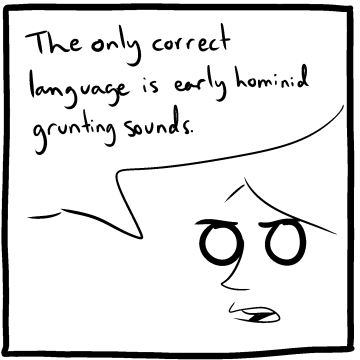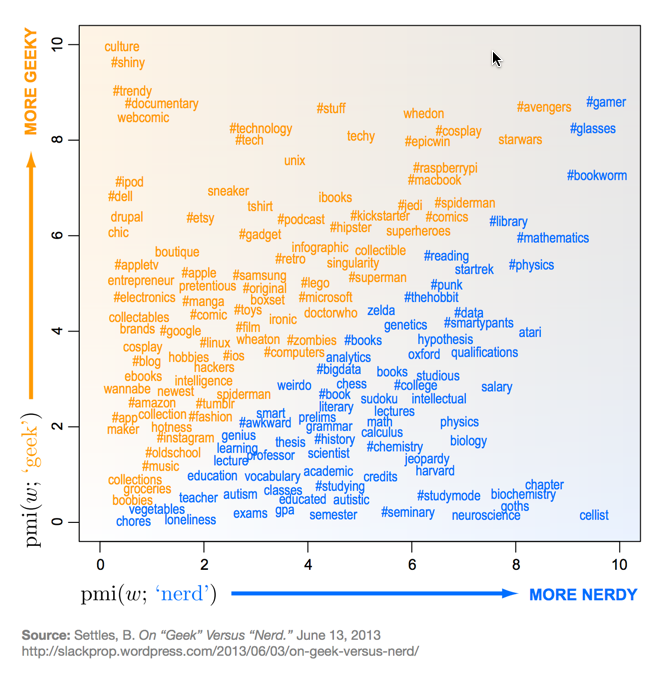Outdorking word-dorks
« previous post | next post »
Yesterday's SMBC:
The aftercomic:

(And in the other direction, this…)
The development of dork is interesting — according to the OED (entry dated 1989), it began (circa 1964) as an American slang term for "penis", and then came to be (circa 1972) "A foolish or stupid person; also a general term of contempt".
Then at some point it joined geek and nerd in the list of disparaging words for people with odd interests. But as far as I know, no one has integrated this third dimension into the geek-nerd space developed by Burr Settles:
Update — I was wrong, as Dan Hirschman pointed out in the comments (source):



Boris said,
January 3, 2015 @ 2:05 pm
I find it fairly buzzwordy when people invest in everyday items instead of simply buying them. As if you can't just buy a Blu-ray disc on a whim – you have to consider the investment and the return on investment. "Am I going to watch it once? Many times? What's the resale value?"
Licia said,
January 3, 2015 @ 2:42 pm
Two more humorous takes: The Difference between Nerd, Dork, and Geek Explained by a Venn Diagram and a Chuck & Beans cartoon.
[(myl) Thanks! Here are the images, to guard against future link rot:
and
]
Dan Hirschman said,
January 3, 2015 @ 3:58 pm
I tried to incorporate nerd, geek, and dork in a ternary plot using google search results here. My takeaway was that nerd and geek have become almost indistinguishable in usage ("chem" is associated with "nerd", but "chemistry" with "geek", etc.), while dork remains a separate term.
Exploring the meanings of ‘geek’ vs. ‘nerd’ said,
January 3, 2015 @ 3:59 pm
[…] Liberman pointed out a nice use of pmi to explore the difference in meaning of geek vs. nerd done last year by Burr […]
tk said,
January 3, 2015 @ 7:00 pm
re date of 'dork': In the summer of 1963, I was in a combined group of Boy Scouts (i.e. not all from one Troop) attending Philmont Scout Ranch in NM; one of the group was almost immediatly dubbed "Dork." (I think I have contemporary photograph captions as documentation if needed.)
Richard Hershberger said,
January 3, 2015 @ 8:19 pm
@ Dan Hirschman: I have seen various attempts to distinguish between nerds and geeks since at least the 1980s. None of them were terribly convincing of the proposition that there was in fact any distinction. Neither do I find anything posted here particularly persuasive.
Q. Pheevr said,
January 4, 2015 @ 12:52 am
Here's Dorothy Gambrell's take on it in a 2002 Cat and Girl comic: http://catandgirl.com/?p=1341
[(myl) Nice:
]
D-AW said,
January 4, 2015 @ 3:57 am
And what about "Right?!" ? I've been looking for discussions of this affirmative-response usage for some months but haven't found anything illuminating. Doing the legwork in corpora has been tricky since it's hard to distinguish from plain old "right?" (had not seen it with ?! before – that's useful, but not standard). Has there been a LL entry on this? Again, hard to search for – I find one on "I know, right?" (http://languagelog.ldc.upenn.edu/nll/?p=3057), which is close.
Brett said,
January 4, 2015 @ 10:11 am
In The Prehistory of the Far Side, Gary Larson tells of having a caption for one of his cartoons rejected by his editor for using "dork." Larson (born 1950) said it was a common mild insult in his youth, and he'd had no idea it ever meant "penis." Combined with other comments I've since heard from people of similar ages, I suspect the genital meaning was already well on the road to obsolescence before 1964.
Robert Coren said,
January 4, 2015 @ 11:52 am
To the best of my recollection, I first encountered "dork" during the summer of 1964, in a context where it was being used as a general-purpose put-down like "jerk", but with the clear understanding that it was also slang for "penis". As "jerk" had done much earlier, it has long since lost its obscene character — I was hearing it on network television in the 1980s.
J.W. Brewer said,
January 4, 2015 @ 12:09 pm
I am puzzled by why "D&D" should be so much geekier than "Dungeons and Dragons" in the Hirschman triangular plot. (I realize it's just graphically depicting underlying data trends – could there be a prosodic or phonological difference since it's hard to see a semantic one?)
Q. Pheevr said,
January 4, 2015 @ 1:08 pm
To bring this back to the SMBC at the beginning of the post, Zach Weiner’s choice of "dork" there seems appropriate to me as a description of peevers. Applying the three terms to language, I'd say that:
A language dork is the most likely to try to 'correct' your grammar, spelling, or usage;
A language geek is the most likely to speak Klingon, Elvish, or, for that matter, Esperanto; and
A language nerd is the most likely to do scholarly research in descriptive or theoretical linguistics.
But I think there's also a lot of overlap between the "geek" and "nerd" categories.
Dan Hirschman said,
January 4, 2015 @ 1:21 pm
@JW Brewer – That was basically my argument – there are a lot of differences in nerd vs. geek that can't be easily explained by a semantic difference (chem vs chemistry, bio vs. biology, etc.), which suggested to me that there isn't much of a difference between them. But I'm not a linguist, so I don't know how to extend the argument much past that!
the other Mark P said,
January 4, 2015 @ 3:39 pm
@ Richard H
I think there is a difference, and an increasing effort to build a firm distinction between geek and nerd.
The reason being that the world increasingly needs "geeks" — people passionately interested in technological and scientific interests.
The world does not need more "nerds", and probably never will.
So building a distinction enables us to persuade more students to study "geeky" subjects at school, and have "geeky" hobbies at home. Without quite the same stigma that comes with "nerd". It's working too, based on my exposure to High School students.
If you don't think the distinction between geek and nerd has been built think about the public usage of the two. People call Bill Gates a geek, with the intention to laud him. Calling him a nerd would have a very different effect. There was a film in my childhood "Revenge of the Nerds". Calling it "Revenge of the Geeks" would just have been wrong.
Martha said,
January 4, 2015 @ 5:06 pm
Maybe "D&D" is geekier than "Dungeons and Dragons" because it's geekier to know what "D&D" stands for.
Bloix said,
January 4, 2015 @ 5:55 pm
In my idiolect, a dork is a socially incompetent person, virtually always male. Not necessarily stupid or having odd interests. Just a person who doesn't fit in – says random things, dresses badly, is clumsy and nervous in company (esp around girls).
Geeks and nerds may often be dorky, but dorks aren't necessarily geeks or nerds. And to me "word dork" seems like an error.
Blister said,
January 5, 2015 @ 2:18 am
First time I noticed something on television that echoed real life was on "Leave it to Beaver" when Wally called Beaver a dork. That show went off the air in 1963.
richardelguru said,
January 5, 2015 @ 7:43 am
Am I the only person here who wanted to correct her use of "corruption" to 'lenition' in the SMBC?
:-)
Brett said,
January 5, 2015 @ 9:01 am
@the other Mark P: My impressions about the relative positions of "geek" versus "nerd" are just about opposite to yours, I'm afraid. (I would call the people we need more of "nerds.") So efforts to draw sharp distinctions between them aren't entirely working out.
BZ said,
January 5, 2015 @ 4:41 pm
Being Russian, I always thought dork had something to do with дурак (durak) which means fool or stupid. It seems plausible due to their similar meanings, but looking at the etymologies, while дурак has roots in Greek and is cognate with "Thor", dork is apparently an alteration of "dick".
MikeA said,
January 6, 2015 @ 1:07 pm
Circa 1961, I first heard "dork" defined in the "social outcast" sense. I don't think I ever head it as "penis". Just a data point.
Matthew McIrvin said,
January 6, 2015 @ 4:43 pm
There's a series of children's books called "Dork Diaries" that are basically just a marketed-to-girls imitation of "Diary of a Wimpy Kid."
"Dork" here is just the deprecatory self-description of an early-teenage girl who has ordinary early-teenage awkwardness (with some class issues: she feels she fits in poorly with her wealthier peers). Here, the term seems to have become leached of anything more specific.
Owlmirror said,
January 10, 2015 @ 10:49 pm
[Apologies if this is duplicate — I am not sure if my first attempt went to moderation, or to nowhere at all]
Some years ago, Dylan Meconis offered a visual nerd taxonomy of stereotypical nerd/geek/dork archetypes, which also has the poor dork at the bottom of the hierarchy.
While there was some discussion of the topic when she posted it in 2008 [ quirkybird.livejournal.com/502939.html ], I don't think anyone pointed out that her own earlier journal entries (from 2002 or so) has usages of "dork" in a way that certainly seemed more like the way she was portraying "geek". Also in 2002, and germane to the topic of "language dork", she posted a page of the comic she was working on with incorrect French grammar, and received corrections from her readers. Her response was (copied from the archive.org page for the comic[1]):
Clearly there was drift in meaning and connotation of "dork" in her own mind between 2002 and 2008 (and possibly even now), and it might be interesting to try and figure out what might have led it it.
_______________________________________
[1] web.archive.org/web/20020803064745/projectkooky.com/dylan/biteme/biteme.html
DWalker said,
January 14, 2015 @ 1:45 pm
The Venn diagram reminded me of the cool chart of men at http://weknowmemes.com/2011/10/men-venn-diagram/
:-)